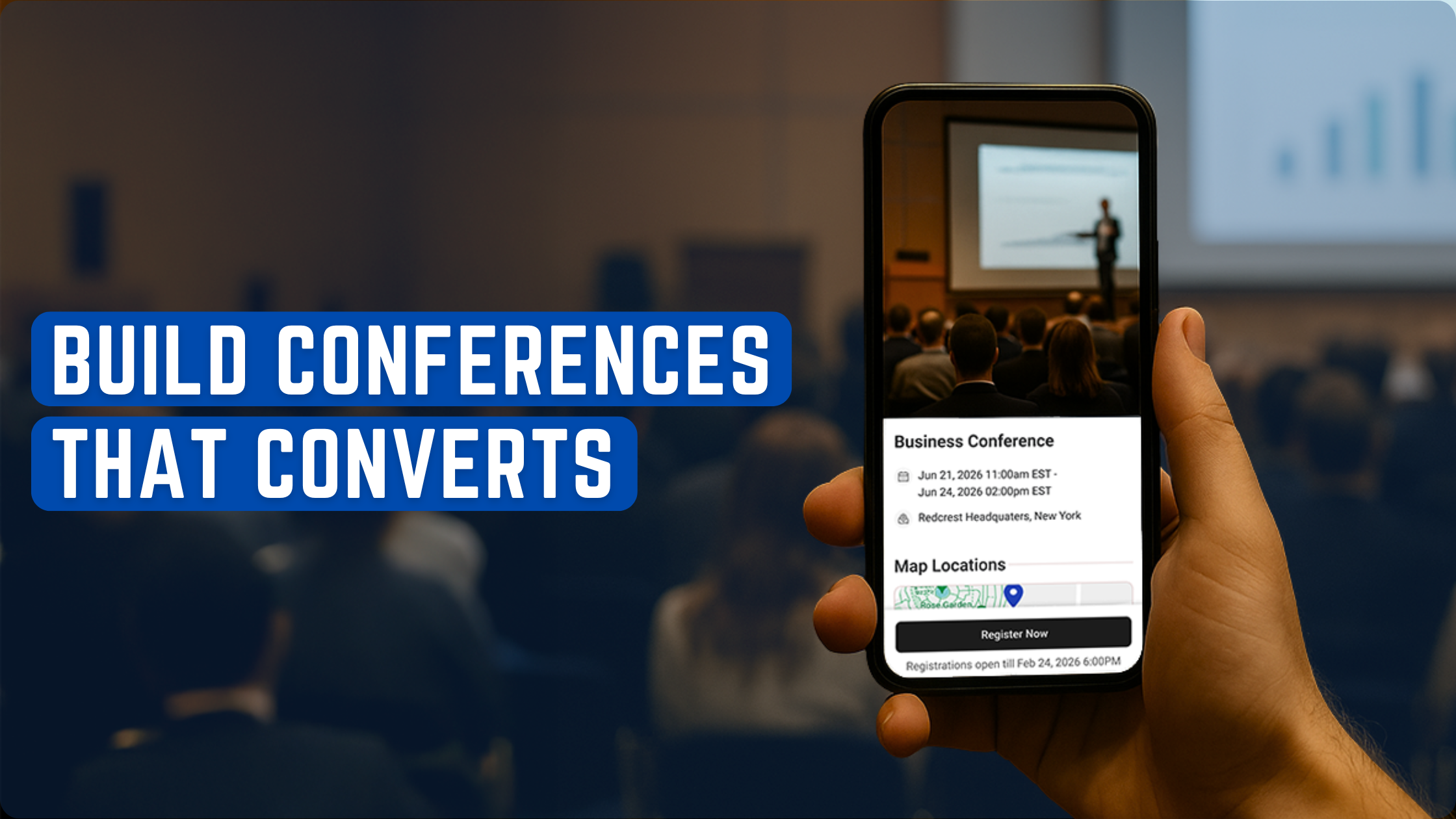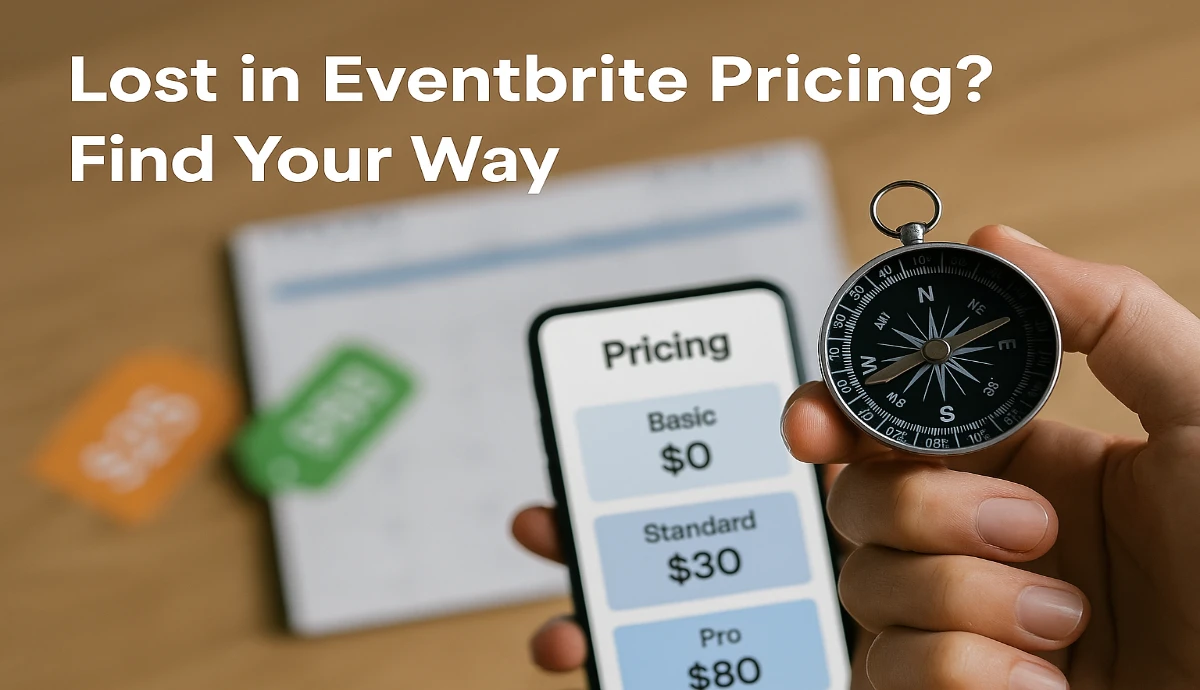What's the first thing that comes to mind when you think of event management? Is it 'complexity,' 'stress,' or perhaps 'unpredictability'?
If yes, you need a solution that can simplify your life and make it easier. And that's exactly where AI comes in.
AI is changing the way we live and work, including event management. In this article, we'll discuss how AI can improve event management and how you can use it to your advantage. We've also listed some tools that you can start using right now.
Let's dive in!
A. Why to Use AI for event management?
Event management is undoubtedly a critical aspect of any business. The success of organized events, small or large, heavily weighs on the efficient functioning of the event management team. In such a demanding environment, AI can emerge as an indispensable ally.

AI can streamline the event planning process by easing some of the most significant burdens event organizers face.
From managing attendee lists and registrations to formulating comprehensive schedules and organizing resource allocation, AI can automate these tasks to ensure consistency and reduce potential human errors.
Furthermore, AI allows for enhanced personalization to ensure a top-notch experience for all attendees. AI-powered systems can analyze attendee behaviors, preferences, and interactions to create highly tailored event experiences.
This could range from suggesting relevant sessions to engage with, to providing personalized event material.
B. 10 different ways AI can help in event management
When used correctly, AI can help you streamline events from planning to execution and even post-event analysis. Here are 10 ways AI can help you with your next event.
1. Event planning
AI technology can greatly aid in planning an event. It transcends the traditional approach by offering data-driven insights such as historical data analysis, predictive analytics, performance evaluation, and demographic trends.
Instead of planning events based on assumptions, you can use AI to process vast amounts of complex data to determine the most effective way for their event or campaign.
For example, if you struggle to find a speaker or a kickass name for your event, AI can help you find the best options. With AI technology, you can virtually eliminate your event planning process's guesswork and research hours.
2. Personalization
Personalization breathes life into the impersonal, turning an attendee's experience from generic to unique. Artificial Intelligence (AI) is critical in this transformation, particularly in events and conferences.
AI-powered systems can analyze attendee data - their interests, past interactions, professional background, etc., to generate insights about what each attendee will most likely engage with at an event.
For instance, a tech enthusiast attending a technology conference might receive suggestions about AI-related talks, VR demos, or networking events with industry leaders. The AI system can send these personalized recommendations via email or through the event mobile application, ensuring it is in a format the attendees would interact with.
3. Networking
AI can analyze the profiles of attendees, focusing on aspects such as their industry, job roles, shared interests, and professional objectives.

This information can be gathered through event registrations, social media profiles, or attendee surveys. Once the AI system processes this data, it can cluster attendees with similar interests, backgrounds, and objectives.
Based on these clusters, you can design targeted networking sessions or activities that cater to the specific needs of different groups.
For example, you can arrange roundtable discussions on industry-specific issues, breakout sessions on shared business strategies, or networking events dedicated to specific interests.
4. Virtual assistants
AI-powered virtual assistants like chatbots are gradually transforming guest experiences at events. They can assist attendees in real time with various queries related to the event schedule, venue details, transportation information, etc.
Furthermore, these chatbots can provide personalized advice based on the individual's preferences and requirements identified from their queries.
For example, if an attendee is looking for specific information or questions, the chatbot can provide personalized answers to their queries and recommend relevant sessions based on their preferences.
This instant, personalized assistance significantly enhances the attendee experience while reducing the workload of event staff, as they can focus on more complex queries or tasks.
5. Promotion
AI can significantly enhance promotional efforts by providing insights from your audience's past behaviors, interactions, and preferences. This enables you to tailor the promotional content and strategy accurately.
For instance, AI can identify that video content posted on social media during afternoon hours leads to higher engagement among your target demographics. Utilizing this information, you can schedule their most critical promotional content during these times.
Similarly, AI can automate responses to certain types of engagements (likes, shares, comments) on social media platforms to amp up interaction levels.
For instance, an AI tool can be programmed to send a thank you message or a special discount code to a user who shares your promotional post. This level of automation combined with personalization can boost interaction and engagement with your event promotion.
6. Ticketing
With a tool like Ticket Generator, your event ticketing strategy can become considerably more straightforward and effective.
For instance, AI algorithms could help establish optimal ticket pricing strategies. They could do this based on factors such as demand dynamics, time of purchase, and competitor pricing. They could also analyze historical ticket sales data available with Ticket Generator to forecast future sales trends, maximizing ticket sales and profitability.

AI could also improve the customer journey by facilitating smooth transactions via smarter payment gateways, reducing friction for potential attendees and enhancing their purchasing experiences.
This would also enable the quick generation of tickets, each equipped with details like guest name, hall number, seating arrangement, and a QR Code for easy validation.
7. Promotional content calendar
The creation of promotional content is a key part of the event planning process, with the goal being to attract attendees and generate excitement. AI can help by creating relevant and compelling content for each marketing stage, from initial outreach to ticket sales.
This could include social media posts, email campaigns, and landing pages for specific events.
You can use tools like ChatGPT to automate the creation of content, which can be tailored to each audience group. This can include a welcome email and personalized messages for people who have clicked on your website or engaged with social media posts related to your event.
8. Real-time monitoring
With Ticket Generator, you can easily create and distribute tickets, freeing up more time to focus on other important aspects of your event, such as monitoring and responding to real-time data.
While Ticket Generator does not include AI-based real-time monitoring, you could harness external AI tools to gain enhanced insights during the event.
For instance, using the Ticket Validator app, you could process data obtained from scanning tickets - each with a unique QR Code. This real-time data allows you to track:
- Attendee engagement
- Number of tickets sold
- Discount code applied
- Most popular event dates and times
- Best-selling tickets and so much more
This will help you better understand which event features are most effective at driving ticket sales and engagement. With this data, you can make informed decisions about how to improve future events.
9. AI video generation for your event teaser
AI can create strong video scripts for teasers and promos by reviewing the event information, such as type, theme, name, and description.
You can now create a video with your face using just your words. All you have to do is pick an image of yourself as the avatar and choose what language you want. The software will make all the rest happen.
10. AI-powered event landing page content
Generating content for event landing pages can be a time-consuming task. You need to do a lot of research and find relevant information from different sources, which takes up much of your time. AI can help by automatically creating relevant, unique content for your landing page. To further ensure accuracy and originality, you can use an AI checker to validate the content before publishing.
Coupled with Ticket Generator, each ticket purchase on the AI-driven landing page can instantly generate digital tickets with unique QR codes. Tickets can be emailed to the attendees, streamlining the overall ticket buying experience.
Next steps
Now you know how you can use AI for event management. The next step is to start implementing everything that you just learned.
Here's the tool stack that you need to get started:
- ChatGPT: For every need, from ideas to content creation
- Pictory: To create videos from your script
- Instachamp: To automate actions on Instagram
- Ticket Generator: One stop solution from registration form to event analytics
What is left is your action. Start designing your tickets now and start tracking the results!






.gif)






